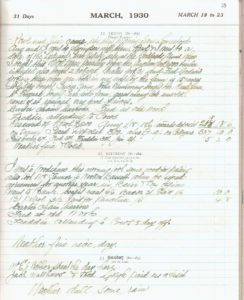Elliot Woolford
In a meticulously kept diary, Elliot Woolford provides the reader with a no-nonsense view of farming life spanning more than 45 years. His livelihood was forever at the mercy of the vagaries of the weather, fluctuating market prices and in 1917, the effects of the Great War.
Elliot and his brother Rowland acquired the tenancy of Hook Farm in 1899. By 1917 both brothers were married. Rowland and his wife Kate were farming at Great Somerford. Elliot and his wife Amy continued to farm at Hook where the Woolford family remain to this day.
Then as now there was no place for sentimentality in farming, or was there? Farming practise today require that livestock are tagged and documented, their movements precisely recorded. Tucked away in the pages of the 1917 diary is a flimsy piece of paper, the pencil jottings fast fading. This is a record of the breeding programme for the cattle on Elliot’s farm. From January to September the cows were sent to be served by bulls on neighbouring farms. Elliot knew his animals individually and by name, among them Pretty Maid, Blossom and Fillpail.
As the country entered the third year of war Elliot records the impact made upon his work and the farm. He writes on March 2:
‘I called at the Recruiting Office this morning “re Walter E. Howard” who is 18 yrs and got his papers to go into the Army on 12th March asking if they would let him off for two months as I am behind with my work & they gave him to April.’
However, this arrangement didn’t suit young Walter, who gave a week’s notice and left Elliot’s employment on March 10.
Perhaps the most poignant diary entry is one made on Boxing Day 1917 when Elliot and Amy visited their friends Mr & Mrs Webb at Chaddington Farm. Elliot writes:
‘Frank Webb was home he is in the army.’
Frank Curtis Webb was killed in action just three months later. His name is included on the memorial at Arras and closer to home on the Lydiard Tregoze War Memorial at Hook. He was 24 years old and has no known grave.
At the end of 1917 Elliot records his income and expenditure month by month. He had paid out £1,556 while his income received totalled £1,563 8s 10d, a profit of just £7 8s 10d. A small return for a difficult year and so much hard work.

